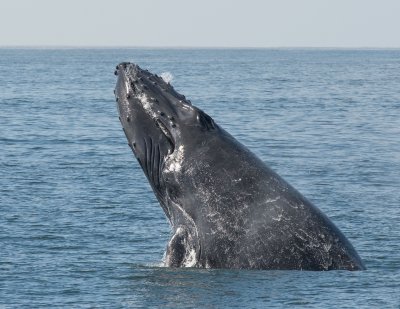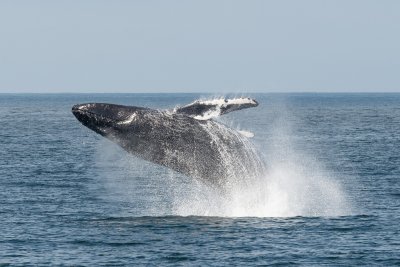Just after a 4.7 magnitude earthquake hit California, whales off the coast went "nuts," leaping out of the water in a mass breaching event.
The earthquake on Tuesday struck along a "creeping" section of the San Andreas Fault, seismologist Lucy Jones said in a tweet. It hit near Hollister, about 35 miles from where one of the Blue Ocean Whale Watch boats was stationed.
Tour guides and passengers was watching a pair of humpback whales when they noticed three wales in the distance start to breach. Breaching is where a whale breaks the surface of the ocean, leaping into the air before crashing back down.
"Two distant pairs were double breaching and a single whale breached as well. Then suddenly the whales [we] were watching double-breached," the company wrote in a Facebook post. "We later found out this all happened at the same time as a 4.8 earthquake, whose epicenter was only 35 miles away, generated sound underwater in Monterey Bay. This obviously could have been a coincidence, but the timing was uncanny! Whales have excellent hearing and their surface activity could have been in response to the earthquake."



Speaking to USA Today's For The Win Outdoors, Katlyn Taylor, a naturalist on board the whale-watching vessel, said: "The way it all went down on the water really seemed like a reaction from the underwater noise in the canyon. As soon as we said on the radio that the whales were going nuts in every direction, another captain said they had received an earthquake notice."
Kate Cummings, a captain with Blue Ocean Whale Watch, also told the website: "All in all, seven whales within four miles of us were breaching like crazy. I'm usually very skeptical of these sorts of things and lean toward it being a coincidence, but something that pushes me back the other way is the fact that the whales haven't been very surface active in general this year."
It is thought breaching behavior plays a role in whale communication. A study published in Marine Mammal Science in 2016 looked at 94 groups of whales, examining the social and environmental contexts in which breaching took place. Findings indicated that breaching may be a way of passing on information to distant social groups—the behavior decreased significantly when the nearest other whale group was within 2.5 miles, compared to further away.
By leaping into the air and crashing back down, the whales can produce large sounds that travel long distances through the water.
Earthquakes produce seismic waves that travel through the Earth that some animals appear to be sensitive to, and there are reports of whales leaving an area during an underwater earthquake.
Whale researcher Alisa Schulman-Janiger told FTW Outdoors that she had never heard of whales breaching as a result of an earthquake. "To have multiple whales suddenly breaching over a large area at the same time, and it just happens to coincide with the earthquake? I think that's super interesting," she is quoted as saying.
Uncommon Knowledge
Newsweek is committed to challenging conventional wisdom and finding connections in the search for common ground.
Newsweek is committed to challenging conventional wisdom and finding connections in the search for common ground.
About the writer
Hannah Osborne is Nesweek's Science Editor, based in London, UK. Hannah joined Newsweek in 2017 from IBTimes UK. She is ... Read more





